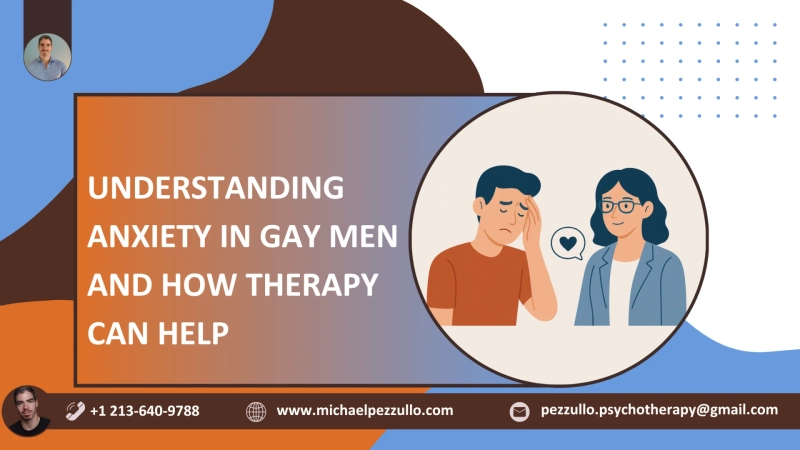Anxiety is something many people deal with at some point in their lives. But for gay men, anxiety can take on unique forms and often shows up in ways that are harder to recognize or talk about. This isn't because being gay causes anxiety—but because of the experiences many gay men face growing up and navigating a world that hasn't always been welcoming.
Understanding how anxiety affects gay men, and how therapy—especially with a gay therapist or someone trained in LGBTQ affirmative therapy—can support healing, is an important step toward better mental and emotional well-being.
Why Anxiety Can Show Up Differently in Gay Men?
Most anxiety comes from a sense of fear, uncertainty, or perceived danger. For gay men, this can be tied to personal history, societal pressure, or even daily social interactions. Here are some common ways anxiety may develop or look different:
1. Growing Up in Silence or Shame
Many gay men grew up hiding a core part of themselves. Whether or not someone experienced bullying or rejection, the pressure to "pass," hide feelings, or constantly monitor their behavior can create long-term stress. This early survival pattern may become automatic, leading to anxiety even in safe environments.
2. Fear of Rejection or Judgment
Even after coming out, some men carry a fear of not being accepted—by family, by peers, or even within the gay community itself. This can lead to social anxiety, overthinking, or difficulty forming close relationships.
3. Perfectionism and Overachievement
Trying to be “the best” can sometimes be a way to compensate for feeling different or not enough. High-functioning anxiety is common—on the outside everything seems fine, but internally, there's pressure, self-doubt, or constant worry.
4. Relationship Stress in LGBTQ Couples
Gay and LGBTQ couples may deal with added stress from things like family disapproval, lack of legal protections (in some regions), or different experiences with coming out. These factors can strain even strong relationships and add to feelings of anxiety and emotional distance.
5. Internalized Homophobia and Shame
Even without realizing it, some gay men carry messages from early life that being gay is "wrong" or "less than." These beliefs can live under the surface and feed anxiety, especially around sex, intimacy, or being emotionally vulnerable.
Common Signs of Anxiety in Gay Men
Anxiety doesn’t always show up as panic attacks. It can appear in everyday habits, thoughts, and physical symptoms. Some examples include:
- Overthinking or replaying conversations
- Avoiding intimacy or commitment
- Feeling like you have to constantly prove yourself
- Physical tension, poor sleep, or stomach issues
- Worrying about what others think—even in safe spaces
- Constant self-criticism or fear of failure
Many of these patterns become so familiar that they feel like part of your personality. But they're often signs of anxiety—and they can be worked through.
How Therapy Can Help
Therapy offers a safe space to untangle where anxiety is coming from, and how it’s impacting your life and relationships. Here’s how it can make a real difference:
1. Naming the Root Causes
A skilled therapist—especially one who understands the LGBTQ experience—can help you explore how past experiences are showing up in your current life. This might include unpacking family dynamics, early trauma, or harmful messages you’ve internalized.
2. Learning to Calm the Nervous System
Therapists trained in modalities like somatic therapy, EMDR, or mindfulness-based approaches can teach tools to manage anxiety in the body. This helps reduce physical symptoms and builds a sense of control.
3. Working with a Gay Therapist or LGBTQ Affirmative Therapist
There’s power in speaking with someone who truly gets it. A gay therapist or one trained in LGBTQ affirmative therapy understands the unique challenges faced by gay men and couples—without needing extra explanation or education.
You don’t have to hold back or worry about being misunderstood. This creates space for deeper healing and more honest conversations.
4. Improving Relationships and Communication
Anxiety doesn’t just affect individuals—it can show up in relationships, too. Therapy for LGBTQ couples helps partners understand each other’s triggers, attachment styles, and coping habits.
Some couples benefit from learning:
- How to handle conflict with less defensiveness
- How to support each other without fixing or rescuing
- How to reconnect emotionally after periods of distance
Even if one partner struggles more visibly with anxiety, both can grow from the process.
5. Shifting from Survival to Growth
When you’ve lived in survival mode—always scanning for rejection or trying to prove yourself—it’s easy to forget what peace feels like. Therapy helps you move from reacting to life into actively shaping it.
You begin to build:
- Self-trust
- Emotional regulation
- Healthier boundaries
- A deeper sense of safety in your own skin
You’re Not Broken—You’ve Been Carrying Too Much
It’s important to remember that anxiety doesn’t mean you’re weak or flawed. It often means you’ve been carrying more than your nervous system was built to handle—especially if you’ve been doing it silently.
Gay men often carry invisible burdens. Therapy is one place to put those down, sort through them, and decide what’s still worth carrying.
Final Thoughts
Anxiety in gay men can be complex, shaped by early life experiences, identity, and how the world responds to both. It can affect everything from self-worth to relationships. But it’s not permanent—and you don’t have to face it alone.
Gay therapy, or LGBTQ-affirmative psychotherapy, offers real things for healing. Whether you’re navigating anxiety on your own or with a partner, therapy can help you feel more at ease, more connected, and more grounded in who you are.
If you're considering therapy, finding a professional who respects your experience—not just as a client, but as a gay man—can make all the difference.



